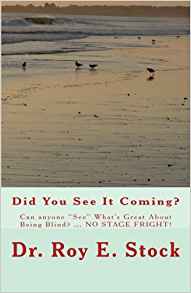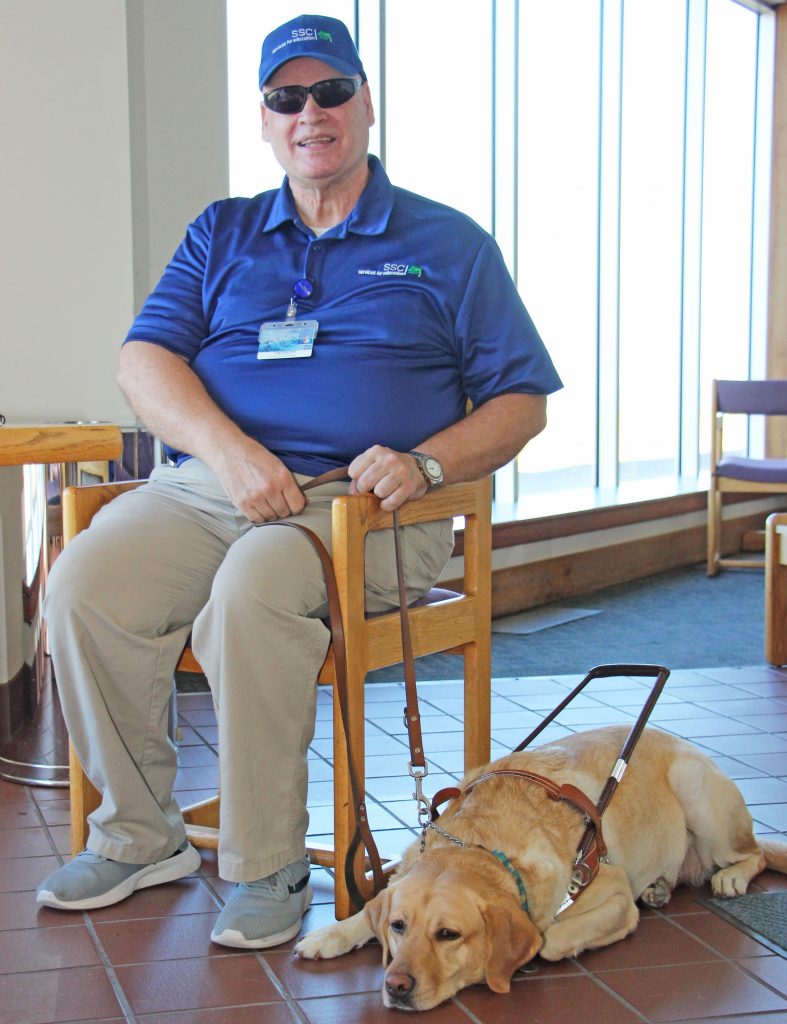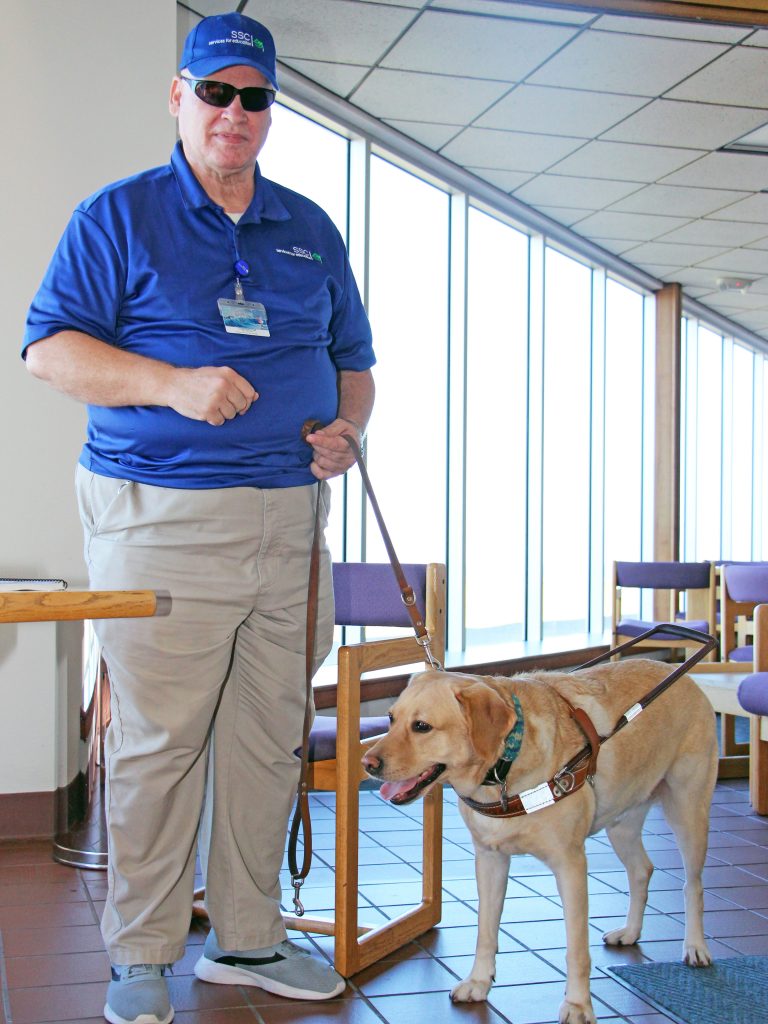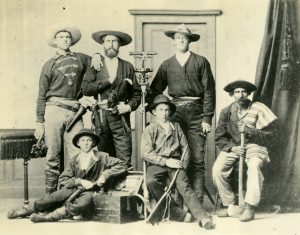When I first met Roy, it was in the library while he was carrying out the business of a routine-yet-arduous task as one of our hard-working custodians on campus. A composed figure of a mature man donning a baseball cap and dark sunglasses along with the uniform, he diligently traveled from one office space to the next in quiet pursuit and retrieval of the daily items to be disposed of and/or recycled.
Initially introduced to library staff members by a long-time custodian, Angie, who accompanied him on his first library route, Roy, in turn, introduced another important team member working on the job.
There stood a tranquil soul, not a human, but a golden-toned, yellow Labrador Retriever named Lindie, a specially trained service dog who serves as Roy’s traveling companion and regularly accompanies him throughout the course of a full day. Lindie curiously appeared to acknowledge the introduction to me, as they approached the doorway of my office. With her big, brown eyes she looked up and dutifully offered a purposeful glance in my direction as I arose from my chair to meet them. The soft, splendid gaze of the elegant creature was fleeting in nature, as she quickly turned, re-focused, and stood at prompt attention beside Roy, eagerly awaiting the next task.
Roy has been completely blind since 1994. I later had the pleasure of meeting Mary, Roy’s wife of 45 years, who is also one of our Facilities Services staff and works with her husband.
Because he can. Roy tells me that he is living his own philosophy, and that is: “To do the best job I can do with whatever I am doing. Whatever you do in life, choose to do your best.” In his day-to-day life, Roy puts it this way: “I have to keep focused on what I am doing.” While the Roy I have gotten to know comes across as outgoing and confident, he said that, “sometimes I’m scared to death… Sometimes, people tend to want to help someone with a disability. A person like myself needs to make mistakes. One needs to have the courage to make mistakes. For example, if someone has their trash can in a certain place, and then moves it to another place the next day, I need to be able to find it. If I don’t believe I can do it, then I can’t do the job. I have to believe that nothing should stop me from doing anything.”
This moving display of courage, self-motivation, and reflection is perhaps a good segue into some of Roy’s significant accomplishments. To name a few, Roy E. Stock holds a Ph.D. in Psychology / Counseling and has also been an ordained minister since 1973.
He is a self-published author of many books. The title of one of Roy’s books is God didn’t Create Me to Fail!: Discovering Keys to Success. Published in 2013, it is part of his Discovery of Recovery Series. Upon discussing this title, he commented, “God didn’t create me to fail. He only creates the potential of what someone can be.”
Roy has a number of “Roy-isms”, as I like to call them, meaning that he comes up with some memorable quotes, such as: “If you can overcome a disability, then you are enabled, not disabled.” Or how about: “Everyone should be accountable for who they are, and not play the blame game”. As a quick follow-up, he adds: “Where does it say [we should] have things given to us?” In his own unique way, Roy shares a piece of advice: “Never put yourself down when you make a mistake.” Just keep trying until you succeed.
I asked Roy what inspired him to write. Here is his response: “In 2000, I tripped and fell over a mop bucket, and I lost the use of my right arm. I used to play music but can’t anymore.” Roy suffered an injury that had a lasting effect on his ability to play music. During the time he was a musician, he started out with the banjo and then went on to play strings and piano. Roy is a very creative person and subsequently began writing more, although he had been writing for some time.
Another important reason to develop the writing, he said, is to keep his mind busy, which helps him to deal with his disability. He said that his biggest fear of being blind is “not having the trigger to remember things – to remind you of how things look… I can’t remember what my wife looks like, because I haven’t seen her in 25 years. I’ve never seen my grandkids.”
Roy definitely likes to display a sense of humor, as is apparent by the title of another of his books, Did You See It Coming?: Can Anyone “See” What’s Great About Being Blind? … NO STAGE FRIGHT!, another installment in the

discovery of Recovery Series. In the face of what some folks may consider a tough break, he wants people to know that it is okay to talk about it. As part of his life story, it is part of who he is, as he goes about trying to set a daily example of staying positive and extending that feeling of good will toward others.
He says, “I love to write because I’m able to share. When you are writing, you are showing yourself in very vulnerable areas…. Everything I’m writing is based on a positive value. I see things based on what they can be. People have the potential to become something that others need to see.”
Some of Roy’s life philosophies include: “I always see good. I love to see people in a positive way. Every person I meet, I thirst for what they have to share.” When I asked him what the name of his publishing company is, he casually turned one of the books over that he brought with him for the interview. On the back cover, there was a postage-stamp size image toward the bottom, and the publishing company name on it was (yep): Three Blind Mice. The publisher is formally listed as CreateSpace Independent Publishing Platform.
But despite the humor sprinkled generously throughout the conversation, there was a distinctly sad moment during the interview, when Roy shared another “hard thing” that happened to him. That was: “The loss of friends when I lost my eyesight. Only one person remained my friend. People are so afraid that they will say the wrong thing.” I was struck by how this experience must have affected him, but then also by how he decided to move forward with his life.
Roy said that the best theme for him is sharing the potential of what each person can be, and that each person has something to share.
Here is another Roy-ism:
“Some people are blinded by cars, houses, and other symbols of what they consider success.” Then the interviewee suddenly asked the interviewer a question: “Do you think I’m successful?” A bit surprised by the question, I simply said, yes. He continued, “But it’s not based on money. It’s based on what I think I can do… It’s based on who you are within yourself.”
Finally, we came upon the subject of service dogs. I asked Roy what service dogs have meant in his life. His response:
“I’ve had service dogs for about 25 years. When you have a service dog, you feel more independent. Each of my service dogs will be cremated when they pass away. I keep their ashes. I don’t grieve for them when they pass away. It just helps me to remember what they did for me.”

“Since I’ve never seen them, I just know that Lindie is different from my other two service dogs. She walks like a Tennessee Walker (horse). When we walk, we go at a very high pace. Lindie walks with her tail up in the air. She prances!”
“A dog shows unconditional love. When they are working, they don’t do it except for your love. They are working and have been trained for unconditional love. You never have to discipline them. I just tug on the leash for her to focus (if needed), and she gets back on track.”
This part of the interview is where Roy started to explain what is meant by recovery therapy in his book series. “Recovery therapy means regaining your focus. Recovery therapy is helping a person regain their focus. Show them the potential of what they can be, and it helps them to regain focus.”
I asked how his blindness disability affects his other senses. His answer: “I can hear 200 feet away from where I am. I can perceive something, because my focus is toward my ears. Your life depends on things through other senses.”
More on Roy’s service dog: “Lindie reads my mind. I let her do her job. Just don’t argue with your dog. I made that mistake with my first dog, Lena. I wanted to go in another direction than where she was going, and I walked into a rosebush!” A big hearty, smile quickly ran across Roy’s face, accompanied with a chuckle, as he recounted the story.
More on the meaning of success: “Success to me is continuing to go forward. I’ve gone through something hard, and I’ve been successful.”
In conclusion, Roy E. Stock is inspirational in his desire to express and share some of the most meaningful things he has discovered throughout his life journey: such as our infinite potential to become the best version of ourselves; how to be able to overcome life’s challenges with courage and tenacity; to actively seek the value in others and what they have to offer; and to find the guide from within to your own personal success.
Roy currently works over at the Corpus Christi Hall building. If you read this blog and happen to see him around, be sure to say hello.

Here are a few books written by Roy E. Stock (author):
Stock, Roy E. Did You See It Coming?: Can anyone “See” What’s Great About Being Blind? … NO STAGE FRIGHT! (Discovery of Recovery Series). CreateSpace Independent Publishing Platform, 2013.
Stock, Roy E. God Didn’t Create Me to Fail!: Discovering Keys to Success (Discovery of Recovery Series). CreateSpace Independent Publishing Platform, 2013.
Stock, Roy E. My Cow Has Died so I Don’t Need Your Bull!: Dealing with Excuses (Discovery of Recovery Series). CreateSpace Independent Publishing Platform, 1998.
Stock, Roy E. Discovery of Recovery Worker’s Guide: Priceless Wisdom (Discovery of Recovery Series). CreateSpace Independent Publishing Platform, 2013.
Stock, Roy E. Morning Thoughts; Evening Reflections (Discovery of Recovery Series). CreateSpace Independent Publishing Platform, 2013.


